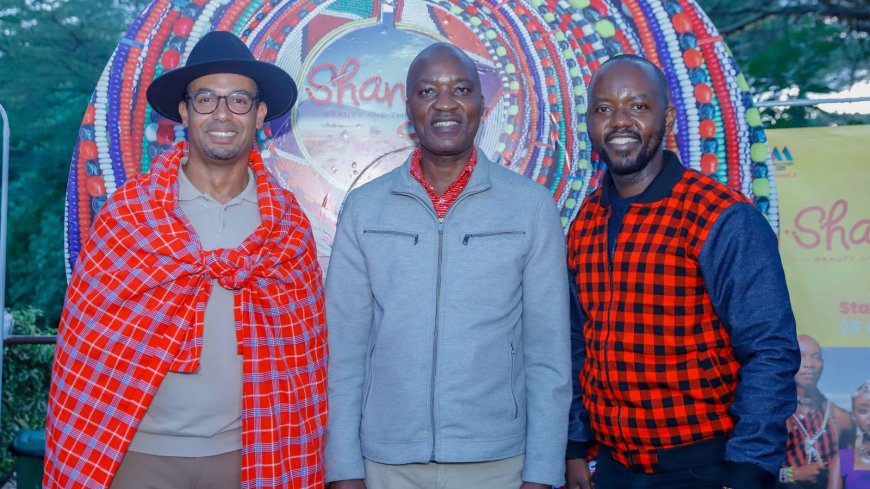On 19th April Multichoice Kenya, a subsidiary of the entertainment giant Multichoice Africa, whipped up a whirlwind of cultural exploration. The exclusive event wasn’t just about popcorn and socialising; it was a portal into a brand new show titled “Shanga,” poised to unravel the rich tapestry of Maasai customs.
The”Shanga” expo wasn’t your typical watch party. The venue itself, a Maasai-themed lodge nestled on the outskirts of Nairobi city in Ongata Rongai, set the stage for a truly immersive experience. The lodge pulsed with ambience – a vibrant tapestry woven from the sights, sounds and energy of the surrounding environment.
Indigenous flora flourished around the lodge, their colours a counterpoint to the vibrant attire of the Maasai Moran. The air hummed with the natural symphony of the region – birdsong intermingling with the rustling of leaves, creating a melodic counterpoint to the rhythmic stomping and chanting of the Moran engaged in a traditional dance presentation.
It was a captivating interplay between the cultural performance and the untamed beauty of nature, a fitting prelude to a show that promised to delve into the heart of the Maasai way of life.
> Betty Kyallo Finds Herself Facing Financial Hardships
Packed with a nationally acclaimed cast that comprises the likes Peris Wambui, a legendary actress who burst into limelight in the 1990s hit KBC soap opera “Tausi,” Brahim Ouma, known for his acclaimed role in “Pepeta,” and Foi Wambui, who stole hearts in “Salem,” – this new television series spins a captivating tale centered around Soilan, a Maasai girl with a fire in her spirit.
When the domineering Naibei attempts to claim her as his bride, Soilan refuses to be a pawn in a preordained narrative. Her courageous defiance sends tremors through the village, culminating in a dramatic showdown at the Eunoto ceremony – a sacred Maasai ritual marking the passage of young men into adulthood. Here, amidst shaved heads and symbolic transitions, Soilan’s rebellion ignites a clash with the formidable Maasai Moran named Ledama.
> Maasai Culture Inspired Gin Hits the Global Market
But “Shanga” transcends a singular act of defiance. It’s a story woven with the threads of three compelling characters, each chasing their aspirations. As their journys intertwine, a captivating love triangle emerges, its complexities set against a backdrop of rags-to-riches dreams.

This vibrant tapestry is meticulously crafted, boasting a fusion of fashion, cultural nuances, and the undeniable energy of the Maasai people. The very essence of their traditions becomes a character itself, breathing life into the story and promising a captivating exploration of a culture both ancient and dynamic.
Nicholas Johnson once declared, “all television is educational,” and with good reason. Millions glean their understanding of the social fabric from the stories they consume daily. While nothing beats real-life conversations and community immersion, television offers an accessible gateway to both contemporary and historical cultures.
Society thrives on boundaries, on the unwritten rules that dictate what’s acceptable and what’s not.
“Shanga” cast transcends their roles as entertainers, transforming into cultural ambassadors. By portraying the dynamics of everyday Maasai life, they offer viewers a glimpse into the community’s core values and traditions. The impact of stories that resonate with hearts and minds is unparalleled. “Shanga” proves that heavy drama isn’t the sole method of holding a mirror to society.
The show isn’t merely entertainment; it weaves real-life concerns into the narrative. As we’re captivated by the story, these on-screen conversations subtly rewrite cultural scripts, reshape our perceptions, and even redefine our social connections to the natural world. This show exemplifies the power of television to blur boundaries.
Society thrives on boundaries, on the unwritten rules that dictate what’s acceptable and what’s not. These boundaries, in turn, are encoded within cultural scripts – products of human interaction and communication about the very nature of “reality.” “Shanga” challenges these scripts, prompting viewers to question and potentially redefine their own understanding of the maa culture.
> How to Become a Traffic Police Officer in Kenya












Leave a comment